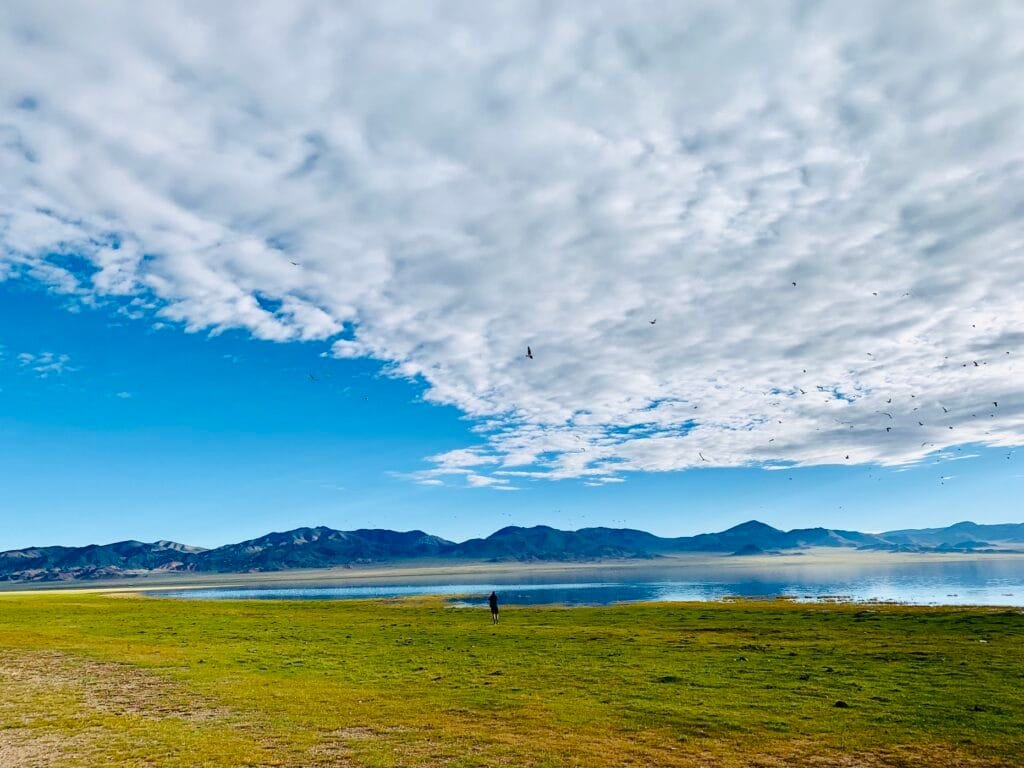Hidden in the vast grasslands of Mangling Township, Mangkang (Markham) County, Mangtso Lake (mang-mtsho) is one of eastern Tibet’s most spiritually significant and visually striking plateau lakes. It is located about 60 kilometers north along National Highway 214. Mangtso is lovingly called “Ama Mangtso” (Mother Mangtso) by local Tibetans and pilgrims, reflecting its deep cultural and religious importance.
According to Tibetan belief, Mangtso (Mangcuo) is spiritually connected to Yamdrok Tso, one of Tibet’s most sacred lakes, regarded as its “mother lake.” This connection elevates Mangtso’s status as a revered sacred female lake within Tibetan cosmology.
The Legend Behind Mangtso’s Birth
A moving local legend explains the origin of Mangtso (Mangcuo) Lake. In ancient times, a kind-hearted Mang woman lived on this grassland. During a devastating drought, when water sources dried up and animals suffered, she noticed a white yak repeatedly drinking from beneath a flat stone.
Curious, she gently moved the stone and discovered a spring flowing endlessly beneath it. Hoping to help the thirsty livestock of the plateau, she moved the stone further. Suddenly, the spring burst forth uncontrollably, flooding the entire plain.
As the water rose, the woman fled toward higher ground, exhausted and frightened. Along the way, she threw away her garments one by one. When she finally cast her apron into the surging water, the flood miraculously stopped. The water settled, forming a lake shaped like a traditional Tibetan apron. Since then, Mangtso (Mangcuo) has been honored as a sacred lake born of compassion and sacrifice.

Geographic Setting and Natural Features
Mangtso is a freshwater high-altitude lake sitting at an elevation of 4,313 meters above sea level. It covers an area of more than 20 square kilometers and serves as the source of the Heiqu River, an important tributary of the Jinsha River, upper stretches of the Yangtze River.
Geologically, the lake was formed through ancient tectonic subsidence, giving it a deep basin and stable water system. Two small islets—Duichoe Island and Duifang Island—float gently within its emerald-green waters, adding depth and charm to the landscape.
Surrounded by rolling alpine grasslands, flocks of birds, and layers of distant snow-capped mountains, Mangtso often appears like a painted scene, where sky, water, and land blend seamlessly.
Mangtso and Tibetan Buddhism
Mangtso holds a profound place in Tibetan Buddhist belief. It is widely regarded as the soul lake of Dorje Phagmo (also known as Vajravarahi or Dorje Pakmo), one of the most important female deities in Tibetan Buddhism.
Historically, 18 monks resided along the shores of Mangtso. Each monk recited the Prajñāpāramitā Sūtras daily. Together, they completed a full cycle known as the “One Hundred Thousand Songs of Prajñāpāramitā.” This long-standing spiritual practice is believed to have further sanctified the lake and contributed to its revered name and status.
Pilgrims continue to visit Mangtso to pray, meditate, and walk around the lake, believing its waters possess deep spiritual energy.
Wildlife and Plateau Ecology
Thanks to its pristine environment, Mangtso (Mangcuo) supports a rich plateau ecosystem. The surrounding grasslands provide grazing grounds for livestock, while the lake itself attracts various migratory and alpine bird species. The clean air, open skies, and minimal human disturbance make the area especially appealing to nature lovers and photographers.
Visiting Mangtso Lake: Practical Information
Admission
- Entrance Fee: 20 CNY
Transportation
- Distance from Mangkang County town: approximately 90 kilometers
- Rental car cost: around 300–400 CNY
- The route follows National Highway 214, offering scenic plateau views
Along the way, travelers can visit Gonan Monastery and Dratop Monastery, adding cultural and religious depth to the journey.
Climate and Best Time to Visit
Mangtso lies in a high-altitude temperate semi-humid climate zone.
- April: Temperatures remain low
- Summer and autumn: Average temperatures range from 8°C to 15.4°C
- Daily pattern: Cold mornings and evenings, pleasantly warm afternoons
- Late October onward: Snowfall begins, transforming the lake into a stunning winter landscape
Proper warm clothing is essential year-round due to rapid temperature changes.
A Sacred Landscape of Myth and Serenity
Mangtso is more than a scenic destination—it is a living blend of legend, faith, and highland nature. From its apron-shaped waters born of compassion to its role as a soul lake in Tibetan Buddhism, Mangtso continues to inspire reverence among locals and travelers alike.
